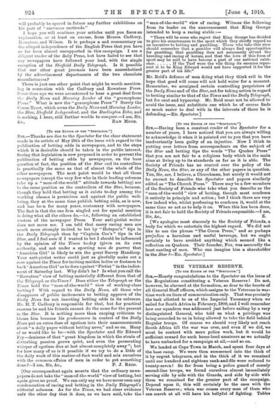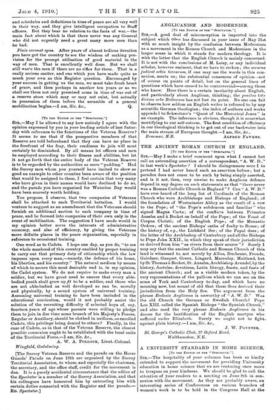THE VETERAN RESERVE.
[TO THE EDITOR OF THE " SPECTATOR."] SIB,—Hearty congratulations to the Spectator on the issue of the Regulations constituting a Veteran Reserve ! Do not, however, be alarmed at the formalism, so dear to the hearts of all General Staff officers, which assigns to the Veterans in war- time work on lines of communication only. That was precisely the task allotted to us of the Imperial Yeomanry when we sailed for South Africa in February, 1900, and I well remember how our squadron was addressed just before sailing by a very distinguished General, who told us what a privilege was being accorded to us in being allowed to take the field behind Regular troops. Of course we should very likely not reach South Africa till the war was over, and even if we did, we must be content with mere police work, but it would be sufficient reward for such home-bred amateurs as we actually to have embarked for a campaign at all,—and so on.
We landed at Cape Town in March, and spent four days at the base camp. We were then summoned into the thick of it by urgent telegrams, and in the thick of it we remained until our hundred and eighteen rank-and-file were reduced to twenty-seven ! So far from being a police guard of merely second-line troops, we found ourselves almost immediately serving side by side with the Guards, and side by side with them we remained for the greater part of the campaign. Depend upon it, this will certainly be the case with the Veteran Reserve ; when war comes every man of them who can march at all will have his bellyful of fighting. Tables
and schedules and definitions in time of peace are all very well in their way, and they give intelligent occupation to Staff officers. But they bear no relation to the facts of war,—the main fact about which is that there never was any General who did not urgently need a great many more men than he bad.
Finis coronat opus. After years of almost tedious iteration you have got the country to see the wisdom of making pro- vision for the prompt utilisation of good material in the way of men. That is excellently well done. But we shall still waste the men if there are no rifles for them. That is a really serious matter, and one which you have made quite as much your own as this Register question. Encouraged by your success in getting us the men, we must take fresh heart of grace, and then perhaps in another ten years or so we shall see them not only promised arms in time of war out of a reserve store which may or may not exist, but actually in possession of them before the scramble of a general
mobilisation begins.—I am, Sir, &c., Q.



















































 Previous page
Previous page